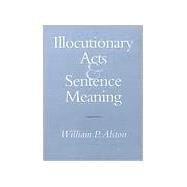Alston defines an illocutionary act as an act of saying something with a certain "content". He develops his account of what it is to perform such acts in terms of taking responsibility, in uttering a sentence, for the existence of certain conditions. In requesting someone to open a window, for example, the speaker takes responsibility for its being the case that the window is closed and that the speaker has an interest in its being opened.
In Illocutionary Acts and Sentence Meaning, Alston expands upon this concept, creating a framework of five categories of illocutionary act and going on to argue that sentence meaning is f








